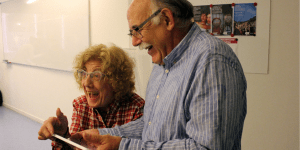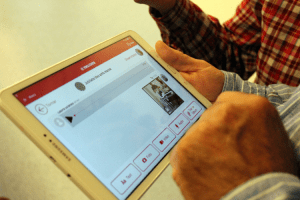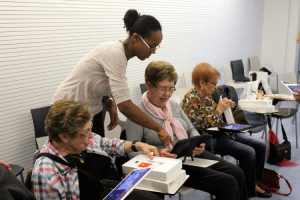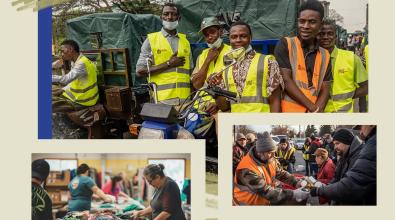In Barcelona, an app with a personal touch keeps seniors connected

Maria Nieves used to feel lonely all the time. After her husband died, the Barcelona resident said, she felt depressed and would often sleep through the middle of the day.
But Nieves said those feelings of isolation went away after she started using a social networking app the city of Barcelona built especially for its elderly residents.
As a member of five app-based chat groups, Nieves said she connects daily with other seniors, and that she jumps at opportunities to assist her new friends. “If they ask for help, I’m always willing to help,” she said. The app also has connected her to social outings and learning opportunities such as English and gardening lessons. “It’s really helped me,” said said. “I’m participating.”
Nieves is one of many Barcelona seniors who are using this app, called “Vincles” — Catalan for “bonds” — which the city developed with the support of Bloomberg Philanthropies after winning the €5 million grand prize in the 2014 European Mayors Challenge. This week, the city announced that the app has surpassed 1,000 users, and that the program will be expanding to help more seniors keep connected.
“This work is the perfect fit for one of the main objectives of the city’s aging and demographic-change strategy: promoting active aging and combating loneliness,” said Deputy Mayor Laia Ortiz. “Vincles encourages relations between the generations, offers participation tools to the elderly, and creates a relationship network.”
A public health problem
Vincles is an innovative response to a growing problem, not just in Spain but across much of the Western world. Experts are increasingly concerned about what some are calling an “epidemic” of loneliness among older people. It’s not just a social issue but an expensive public health problem. Researchers have linked social isolation among older adults to higher rates of heart disease, depression, and mortality. A recent study in the U.S. found that Medicare spends an additional $6.7 billion a year due to conditions arising from loneliness among the elderly.
[Read: Putting residents’ wellbeing first in a city built from scratch]
Barcelona began piloting Vincles in 2017, first focusing on seniors who report an unwanted feeling of loneliness. For those with low incomes, the city offers free use of a tablet pre-loaded with the app, as well as training in the basics of how to use it. As with other popular messaging apps like WhatsApp or Facebook Messenger, Vincles users can take photos or videos and share them with each other, chat in groups or one-on-one with family and friends, make phone calls, send audio messages, and more. (You can download Vincles for iPhone here, and Android here.)
But Vincles differs from mainstream social apps in key ways.
It’s designed with large type, big buttons, and a streamlined interface meant to be simple for older people to use. More important, the city has hired seven facilitators whose job is to spark and moderate group conversations on the app, engage hesitant users so that they feel welcome, and intervene in any social conflicts that may arise.
The facilitators don’t work only online. They also rally users to connect face-to-face, organizing training sessions and social outings and circulating weekly lists of nearby city-sponsored events. The idea is to integrate Vincles with telecare health services and other social care programs the city offers seniors.
The fact that Vincles is a public service, not a privately run enterprise, is important to users like Nieves. “It’s not run by somebody from the street that you cannot trust,” she said. “The city council is behind it. So you can rely on the program much more.”
Tracking results
Last year, the city released a second version of Vincles, after gathering feedback from users and making adjustments based on their ideas. As residents turned in their old tablets for one loaded with the new version, they gathered for training sessions to learn how to use the new features.
At one of those training sessions in November, Nieves was one of a dozen seniors on hand to sign out a new tablet. And before the training kicked off, she and the others were happily snapping photos and videos, laughing as they shared them with each other and their Vincles groups.
These users — given both the tablet and lots of hands-on assistance from the professional facilitators — are part of one group in Barcelona’s experiment, explained Julio Calvo, who manages the project for the city. This month, the service expanded to support a new group of users who get the same level of service but have downloaded Vincles onto their own devices. The team will roll out the service to thousands more seniors this year, including a third group who will use their own devices and get lighter-touch contact with the facilitators.
That structure is key to long-term sustainability of the project, Calvo said. To scale up, Vincles will need to leverage the equipment and data connections users already have so that the city’s assistance goes to people who are less able to pay. Because the facilitation aspect is critical, a key question as Vincles expands will be how many users one facilitator can support before another needs to be hired.
[Read: What cities learned in the Mayors Challenge]
But so far, Calvo said, signs are that Vincles is working. Surveys of early users found big reductions in the number of people reporting feelings of loneliness, and even larger gains in those reporting improvements to their self esteem and state of mind. The city will continue tracking the results through user surveys and data on how people are using the app. “We are measuring it, and it’s having a real impact,” he said. “One of our key learnings is that there’s not a big problem with the elderly and use of technology. If they have the motivation, like speaking with grandchildren, things work out.”
Antonio Ambit would agree. The 86-year-old said he enjoys using Vincles to send audio messages and photos to friends, and sometimes records music to cheer up friends if they’re feeling sad. But his favorite thing to do is to communicate with his youngest granddaughter. “She’s 8 years old, she’s my cute baby and I adore her,” he said. “I send her videos and she sends me videos, and I really like that.”



